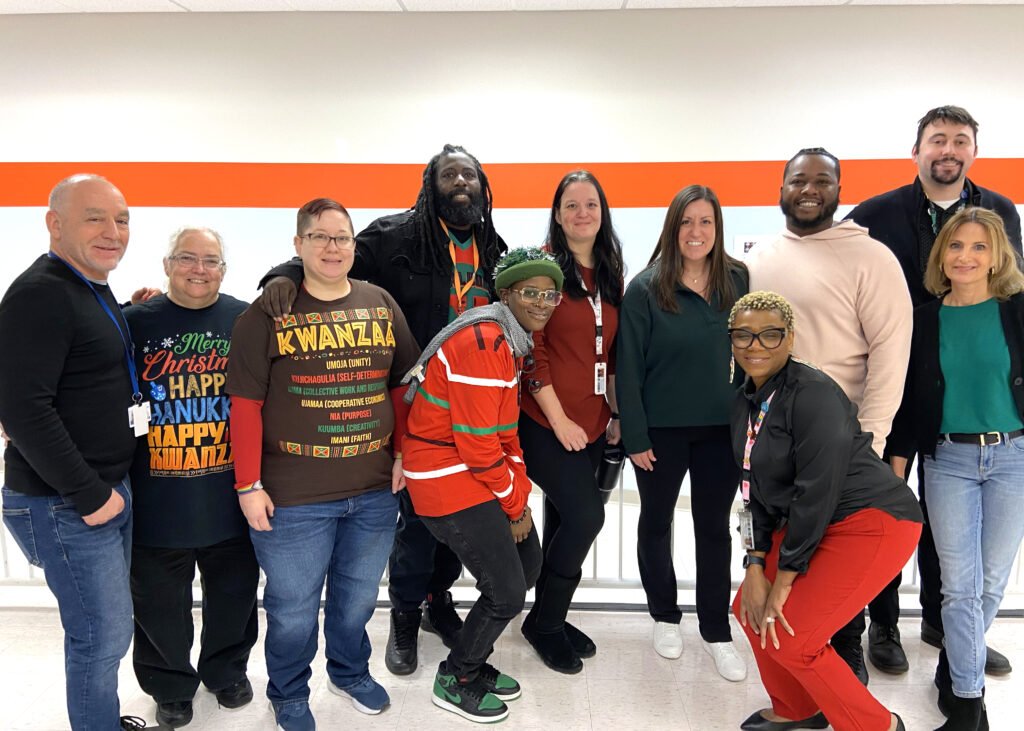Paper Mill Playhouse is one of Spectrum360’s most valued community partners. This Tony Award-winning theater collaborates with Academy360 Upper School in an innovative after-school program called Theater for Everyone. The program is directed by Paper Mill Playhouse’s Director and Lead Teaching Artist of the program, Leslie Fanelli and her Teaching Assistant, Dr. Sean Dineen, D.Litt. This delightful collaboration has run for almost two years, and it continues to be a source of creativity and fun for everyone: students, A360 staff, and the Paper Mill team. S360 recently sat down with Leslie and Sean to learn exactly what they do and why they do it!
What is the value of a theater program for individuals with autism?
Leslie: The value of the program is multi-faceted. The type of theater in which we engage is creative drama, which includes theater games and improvisation, role-playing, storytelling, music, movement, mime, even Broadway-style poetry in American Sign Language,
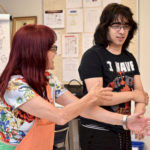
plus some visual art. These activities promote improved communication, cooperation, collaboration, eye contact, body language, gesture, facial expression, language skills, motor skills, self-esteem, having lots of fun–and more!
Sean: I would like to add improved self-expression and group dynamics to the list of benefits. Sometimes, we even add enhanced curriculum like when we enacted the spectacular geologic history that pre-dated the A360 Upper School’s physical site 650,000,000 years ago!
Is there research to back it up?
Leslie: I am not a therapist, but our work is therapeutic. As Director and Teaching Artist, when designing a program, I am always mindful of using Howard Gardner’s Multiple Intelligences (MI) and derivative methodologies that employ ample use of the Bodily-kinesthetic, Spatial, Musical, and Interpersonal intelligences, in addition to Linguistic intelligence. The Harvard Graduate School of Education, where Gardner is the Hobbs Professor of Cognition and Education, has conducted a great deal of research on the success of teaching with these expansive strategies. Celebrating our multiple intelligences is inherent in theater. Communication is much more than the spoken word. And, the bottom line is FUN! If we are not having fun, I am not doing my job. When interest is increased, proficiency is increased. So we “boogie-woogie” in a hands-on fashion and have a blast enhancing our communication skills. That’s Aristotle’s Learning by Doing. This approach is especially important for individuals on the autism spectrum.
Sean: Of great importance is the idea that we are “smart and silly, and silly and smart”. I have a doctorate in History, but I am definitely silly as well. We incorporate Mozart, Dr. Seuss, Pete Seeger, Aesop, Renee Fleming, and use theater activities that foster role-playing and imagination, as well as whatever the students request. This is Universal Design for Learning: the “what”, “how” and “why” of learning—supported by the Multiple Intelligences strategies, as Leslie noted.
Leslie: And we always stay flexible. I prepare with Plan A, Plan B, and Plan C. Then I go with the flow; although I do announce with great fanfare that I am the “director.” Indeed, all theater needs a director. I say, with some comedy, “Somebody has to be the boss.”
Sean: She’s a nice boss.
How did the relationship between the Paper Mill Playhouse and Spectrum360 start?
Leslie: We share a Board of Trustee member in common, Mr. Charles Pascarella. In 2016 Charles took the Director of Education at the playhouse, Lisa Cooney, and former Managing Director, Todd Schmidt, to lunch to meet Spectrum360’s Executive Director, Dr. Bruce Ettinger, and soon after, the program began.
Tell me about a success story with a student.
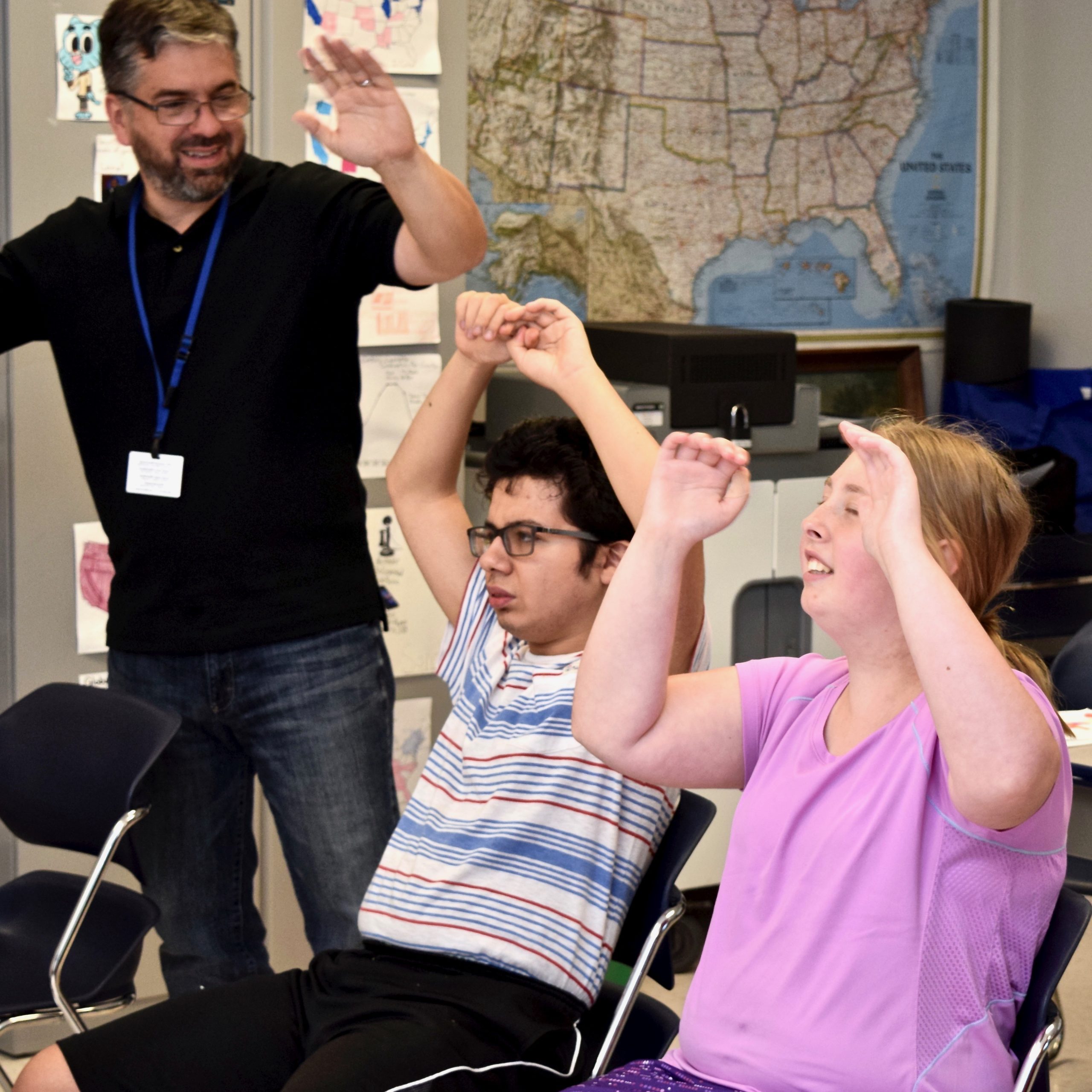
Sean: One student used his love of robots to engage with the larger world. His drawings became a way to use Inter- and Intra-personal Intelligences to create an awareness of positive opportunities outside of his immediate zone of sensory experience. So, we frequently included robots of all sorts in multiple settings. We inserted robots (even as Martians and mice) into several different stories we enacted.
Leslie: Several times I have witnessed students with limited spoken language skills start to speak—sometimes a lot!
What is the most challenging aspect of the program for the students?
Leslie: The most challenging and also the most fun part of the program is a theatre game called “Magic Clay” which requires abstract thinking skills. This theatre game is not just a tough thing for individuals on the spectrum; it is difficult for everyone. In this exercise, we literally make something out of nothing. The students don’t have props and cannot use words, just sounds. Students have to imagine something they would like to become and then act it out for the rest of the class who then have to guess what the student is. Sean and I model the exercise and then get the students to try it. It take a few times, but eventually it becomes their favorite activity. As Sean mentioned earlier, we are always focusing on “the silly and the smart.” This activity is usually on the silly end of the spectrum…but not always!
What surprised you most about working with our students?
Leslie and Sean: Actually, the entirety of Spectrum360 was the marvelous surprise. Wowie Kazowie! What a magnificent organization. We are proud to be a part of it. The students and staff continue to be a total delight! We look forward to future classes with great gusto and anticipation.
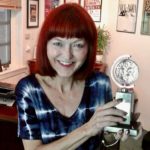
Leslie Fanelli, Director and Teaching Artist at Paper Mill Playhouse, has taught Theater for Everyone Creative Drama since 2011. Additionally, she is the Executive Director and founder of Theatre in Motion, where she directs, writes, and performs at various venues —including at her favorite venue, Central Park. She has 30 happy years experience in Arts in Education. In addition to a love of the arts, Leslie loves her family, traveling, and eating. Her photo shows her proudly holding Paper Mill’s Tony Award for Best Regional Theater in 2016.
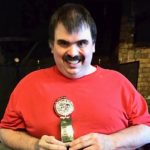 Dr. Sean Dineen, D.Litt., Teaching Assistant, received his doctorate in May 2017, after 12 years of research (on Cold War History, 1948 – 1980) with his friends and academic assistants, Leslie and Hannah Fanelli. They traveled to Australia and South Africa, where Sean conducted research in Parliament and later went on an accessible safari with his research pals. He is a playwright and author of numerous published articles. He has been a Teaching Assistant at the Paper Mill Playhouse since 2011. His photo shows him holding Paper Mill’s Tony Award for Best Regional Theater in 2016.
Dr. Sean Dineen, D.Litt., Teaching Assistant, received his doctorate in May 2017, after 12 years of research (on Cold War History, 1948 – 1980) with his friends and academic assistants, Leslie and Hannah Fanelli. They traveled to Australia and South Africa, where Sean conducted research in Parliament and later went on an accessible safari with his research pals. He is a playwright and author of numerous published articles. He has been a Teaching Assistant at the Paper Mill Playhouse since 2011. His photo shows him holding Paper Mill’s Tony Award for Best Regional Theater in 2016.

